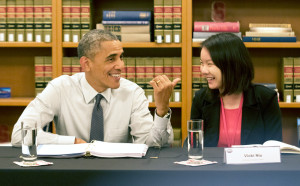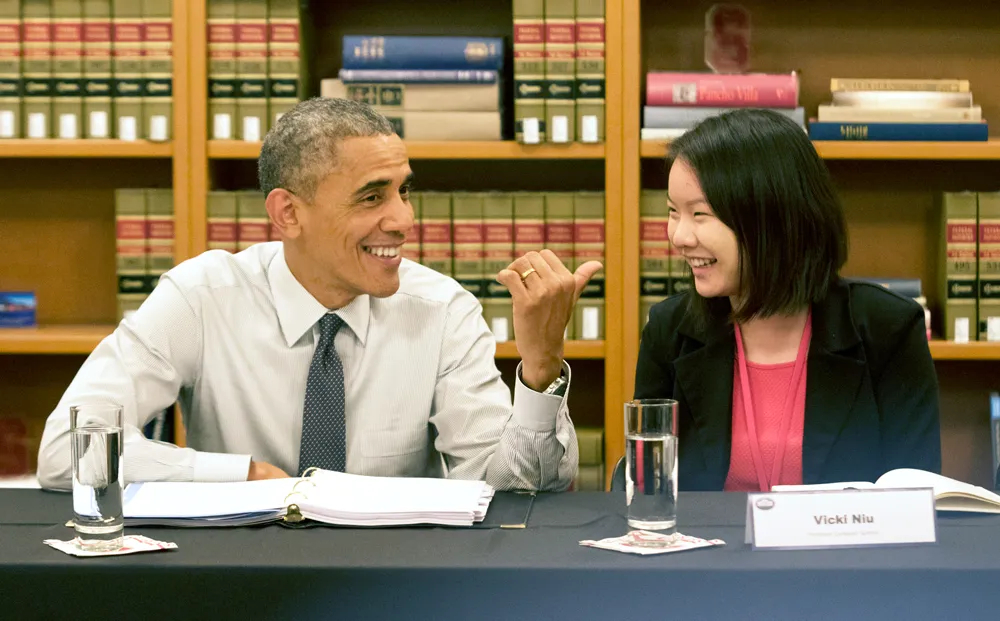Rio LaVigne ’15 signed up to meet several White House officials after the morning session of today’s cybersecurity summit. She did not, however, expect to meet President Barack Obama.
Earlier this week, a group of 10 students with interests in cybersecurity was chosen by various Stanford professors and academics to potentially attend a roundtable meeting with “senior White House officials.” It was not until yesterday afternoon that the meeting was confirmed. And it was not until after Obama’s speech, in a back room of Memorial Auditorium, that the students figured out that they might be meeting the president.

“We walked into the room and pretty quickly noticed there was a nametag in front of every seat except one,” LaVigne said. “The table’s a horseshoe shape, and the one seat that was missing was the one in the very back in the center. It was like, ‘Hmm, okay. That’s interesting. I wonder who’s going to sit there. Someone who doesn’t need a nametag?’”
The first people to enter the room were Senior Advisor Valerie Jarrett, Homeland Security Advisor Lisa Monaco and National Security Advisor Susan Rice. The three officials started a conversation with the students, and after several minutes, Obama entered the room.
“I had a pretty visceral reaction,” said Patrick Cirenza ’15, who also attended the meeting.
The students, Obama and the White House officials spoke on a wide range of topics for approximately one hour. Obama began by addressing sexual assault on college campuses and expressed his support for cultural change on campuses and better awareness.
They then talked about issues of cybersecurity and national security, followed by an open discussion on any topic the students wanted. Trey Deitch ’15, a computer science major who has had a long-time interest in network security, spoke with Obama about his view of cyberattacks.
“I just talked about cybersecurity a little bit, about how it has growing importance in the world and is a new form of guerilla warfare and how it’s inherently asymmetric,” he said. “As someone who’s trying to prevent it, you have to stop every attack whereas an attacker just has to succeed once to destroy all of your effort.”
Other students spoke about issues other than cybersecurity. The United States’ responsibilities in Syria came up, as did the civilian-military divide. Some of the senior attendees even discussed their honors theses with the president.
Many of the students in the roundtable commented on Obama’s personality. Vicki Niu ’18 said he was very down to earth and father-like.
“I made a ‘Thanks Obama’ joke and he laughed at it, and I felt so validated,” she said.
“He cracks jokes whenever he can about certain things,” LaVigne said. “It was very interesting seeing him as a person instead of this big political figure.”
“At the end we were getting together to take a picture,” added LaVigne, who is relatively short. “He called me out and said, ‘Hey Rio, you can just stand in front of me. It’s okay, you won’t block anyone.’”
All of the roundtable students expressed gratitude and a sense of having learned a lot. LaVigne, who comes from a technical cryptology background, said she enjoyed experiencing the policy side of cybersecurity. Niu appreciated hearing Obama’s and other policymakers’ insights on the decision-making process.
“I think a lot of times it’s easy to criticize decisions that are made because they’re not in the position where you have to be meeting these troops or consulting with all these politicians,” Niu said. “It was really interesting to see what his take on it was.”
Members of the student population who were able to attend the summit through the lottery or various student groups expressed similar ideas.
“I think this event is incredibly important because it acknowledges basically a new sphere of warfare and the fact that cybersecurity involves actual private entities today,” said Gabbi Fisher ’17. “The last time that private American citizens were the target of any offensive events was maybe back in World War II, but today, U.S. private citizens again have become basically a target in the way that consumer websites have been hacked. Most recently 80 to 90 million people’s health information was stolen in a recent data breach. It’s just really incredible to be at an event that is paving a policy direction for this new sphere of offense in the world today.”
Tristan Vanech contributed to this report.
Contact Victor Xu at vxu ‘at’ stanford.edu.
